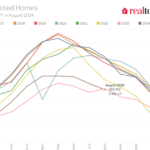Cloaked in a flimsy veil of libertarianism, neoliberalism is not just alive and well in Argentina; it is more virulent and rapacious than ever.
Freedom is on the advance in Javier Milei’s Argentina, as perfectly illustrated in the video below of state security forces beating up pensioners in the street and blasting them with pepper spray and tear gas. Every Wednesday for the past two weeks, thousands of pensioners have congregated outside Congress to protest the rapid loss of purchasing power of their pensions, as the Milei government’s economic shock program continues to, quite literally, bite.
“They are killing us,” one elderly lady cries. “Why? We are just pensioners. One of these brutes just punched an old lady.” In the same video, another grandmotherly protester is asked if she is afraid of the violence , to which she responds:
Afraid? If you are afraid, it paralyses you (NC: otherwise put, “Fear is the mindkiller”). You have to fight for your rights. Lots of blood has flowed for those rights.
🌎Argentina
🎥Milei veta la ley que aumentaría las pensiones minimas a los jubilados.❌Las protestas de pensionistas y organizaciones sociales son reprimidas. pic.twitter.com/piE9MXKFJj
— Alerta Gorria Irratia (@AlertaIrratia) September 5, 2024
“They take more and more money from us instead of taking it from those who have more. The rich are forgiven taxes and evaders are called heroes,” Victor Amarilla, a 72 year old retired bus driver who has to work part time as a doorman to make ends meet, told El País. “We mobilized last Wednesday, we are here today and we will return next Wednesday. We are not going to leave the streets because we come to fight to be better and at the same time we fight for our children and our grandchildren.”
The spark for this latest wave of anti-government protests was Milei’s decision on September 2 to veto an 8.1% increase in public pensions that had already been approved by a large majority in the legislature. The reform sought to partially alleviate the effects of the crushing fiscal adjustment imposed by the Milei government’s hardcore austerity measures as well as the country’s triple digit inflation. According to the Argentine Institute of Fiscal Analysis (Iaraf), roughly one-third of the entire fiscal adjustment is being borne by Argentina’s pensioners.
“The payment of pensions was the budget item most affected by the very heavy cuts in public spending by the government of Javier Milei: almost one out of every three pesos that the public administration stopped spending was the result of paying retirees less,” says Gabriel Puricelli, an analyst at the Public Policy Laboratory. “Milei decides to veto, at the cost of continuing to immediately harm retirees, most of whom are below the poverty line.”
Recent surveys place the poverty rate in Argentina at around 50%-57%. Many of those affected are retirees. From the Spanish online newspaper El Diario:
In Argentina, the majority of retirees, more than five million of them (out of a total of seven million national pensioners), receive the minimum pension of 234,000 pesos (around 221 euros) plus a bonus of 70,000 pesos (66 euros) to bring it closer in line with the basic food basket. According to the latest report from the Center for Argentine Political Economy (CEPA), by keeping the value of the bonus frozen since March, minimum pensions suffered a cut equivalent to 52,000 pesos (49 euros).
With the hike vetoed by Milei’s supporters in Congress, the minimum payment would have risen to 316,000 pesos, which in and of itself was already insufficient… So far this year, official inflation has clocked in at 87%, according to data from the National Institute of Statistics and Census (Indec).
Lower Inflation, But at What Price?
That is certainly an improvement on the situation Milei inherited nine months ago, for which he and his government deserve some credit. Monthly inflation was around 4% in August, compared to 25% in December 2023. Annual inflation was “down” to 236.7%, following four consecutive months of disinflation. But prices are still rising at the fastest rate in the Western hemisphere, including Venezuela, and the collective cost of trying to tame inflation is becoming unbearable for many.
But Milei shows little sign of budging. For him, the only way to lower prices is to bring the fiscal budget back into the black after spending roughly two years in the red.
“If the State does not spend more than it collects and does not resort to (debt) issuance, there is no inflation. It’s not magic.”
This is one area in which Milei has most definitely kept his word. To achieve his precious “zero deficit” target, he has applied the harshest fiscal adjustment program in living memory, slashing 35% of state spending year over year in one fell swoop. One way he has done that is by closing entire government departments and laying off tens of thousands of state employees. By June, 25,000 public workers had lost their jobs while another 75,000 are reportedly under review.
The Milei government has also withdrawn many of the public subsidies that allowed the millions of people living on or close to the edge to at least eke out an existence. The results speak for themselves: between December 2023 and August 2024 the monthly cost of basic services and utilities (electricity, natural gas, water and public transportation) surged almost five fold, from 30,000 pesos per household ($30, by the official exchange rate) to 143,000 ($148), according to the IIEP Observatory of Rates and Subsidies carried out by University of Buenos Aires-Conicet.
Granted, $148 dollars may not seem like much from an advanced economy-perspective but for an Argentine on a minimum salary of 262,432 pesos, it represents 54% of their gross income.
That’s not all: the government has also withdrawn subsidies on medicines, whose prices have been rising above the rate of inflation — not just for the past nine months but for the past four years! A study by the journal Medicina found that “across 360 essential medicines tracked between December 2020 and January 2024, prices increased by a median (IQR) of 1051% (923%-1174%), exceeding cumulative inflation of 849%, with a notable acceleration in price increases since October 2023. Pension benefits during that time increased by 455% under the standard adjustment formula and by 744% when including the one-off bonuses.”
The upshot of all of this is that more and more elderly people are having to choose between buying food, medicines or paying for basic utilities.
“The elderly in Argentina have to choose every day between eating or buying medicine,” said Eugenio Semino, Ombudsman for the Elderly of Buenos Aires. “The elderly in Argentina have to choose every day between eating or buying medicine… (A) humanitarian crisis has been going on for many months. In other words, the situation in terms of the economy and in terms of health has generated not only loss of quality of life among the elderly, but the loss of lives themselves.”
Or as Elon Musk sees it:
Milei is bringing prosperity to Argentina https://t.co/AjUCKvRoq2
— Elon Musk (@elonmusk) September 5, 2024
Neoliberalism Repackaged
One of Lambert’s two simple rules of neoliberalism is “Go Die!” (the other being “because markets”), which is ironic since the one thing neoliberalism refuses to do is curl up and die.
In Argentina, a repackaged version of neoliberalism is being applied, cloaked in a flimsy veil of libertarianism. While millions of Argentines — and probably many more millions of Milei fans around the world — want to believe that Milei’s policies represent a sharp departure from the past, the reality is that this has all been seen and done before — just not quite in such a rapid, aggressive way.
As Michael Hudson said last year in one of his podcasts with Radhika Desai, neoliberalism is far from dead despite all the triumphant eulogies. What it seeks is to make the government invisible or actually disappear in reality:
Neoliberalism advocates an economy without government regulation, with no social protection against fraud or exploitation or predatory impoverishment, no usury laws. They’re against consumer protection. They’re against the ability of debtors to use bankruptcy, which is why Biden made sure that students could not wipe out their student loans through bankruptcy, to free themselves from debt.
So neoliberalism, basically, it’s a dynamic of economic polarization. Neoliberalism is a way in which they can justify why the economy is getting more and more unequal, as if this is a perfectly natural thing, a survival of the fittest, and is really a road to efficiency. And in that sense, neoliberalism is a point—this requires a point of view. It’s an ideology. You could almost say it’s the new religion because it’s a new moral value.
Instead of religion saying we’re for mutual aid and we want to uplift the population as a whole, neoliberalism is saying greed is good, Ayn Rand is good, we want to be free from government, free from government regulation, so the rich can do whatever they want to get rich. And if they do get rich, it’s because they’re productive, not because there’s any exploitation. So neoliberalism is really a cloak of invisibility for all of the problems that we’re seeing today.
The same day Milei vetoed the retirement mobility law, he told, in brutal frankness, the corporate bigwigs gathered at a big business lobby event that: “We came to shrink the State to enlarge your pockets.” There were no soothing words for the SMEs that are bearing the brunt of the crumbling consumption and slumping economic activity wrought by Milei’s adjustment policies. Instead, he lashed out at social justice ideas and Argentina’s labor laws.
One issue Milei isn’t speaking much about is taxation. As part of his libertarian schtick during the presidential campaign, Milei described taxation as a form of state violence, saying he would rather cut off an arm than raise taxes. And people bought it, just like they bought his schtick about burning down the central bank, replacing the Argentine peso with the dollar and getting rid of the “political caste”, many of whom he ended up inviting to join his cabinet.
Once in power, however, Milei not only hiked import and export taxes; he reimposed income tax on Argentina’s lowest earners. He also increased the so-called PAÍS tax, which imposes a 35% surcharge on purchases of foreign currency with the aim of deterring such transactions. Taxation, it seems, is only an act of violence when imposed on the rich, for while Milei’s government refuses to allow Argentina’s most impoverished pensioners to enjoy even a meagre rise in their pension income, it has halved wealth taxes for the richest Argentines.
“Today, the rich pay less in taxes, while they have the luxury of giving lessons on austerity and morality to millions of Argentines who are not making ends meet,” Cristian Girard, the director of the Buenos Aires Collection Agency (ARBA), tells El Economista. “The government celebrates while describing retirees who demand an improvement in their income as ‘fiscal degenerates’.”
What’s more, it appears that the reduction in taxes for the super rich will exert more of a fiscal drain on the government’s finances than the proposed rise in pensions. This is all perfectly in keeping with traditional neoliberal practice. As Lambert wrote in his decade-old article on expressing neoliberalism as simple rules, “the rules do not apply to those who write the rules… or in the world of the 0.01%.”
“Hijos de Puta”
Is it any surprise that pensioners are up in arms? On Wednesday, thousands once again gathered outside the Congress, where a vote was to be held by opposition deputies seeking to override Milei’s veto, for which they needed a two-thirds majority. But unfortunately they couldn’t get it. When the protesters gathered outside the Congress learnt the vote had failed, things got ugly fast, reports Página 12:
When the result of the vote was known in the street (the deputies ratified the veto of the mobility law), the tense calm that had been felt since early was broken. “Hijos de puta! Hijos de puta!” was the rallying cry, as the crowd’s rage was unleashed against the fences that blocked the circulation of Rivadavia Avenue. Retirees and militants banged pots and pans, key chains and whatever was at their disposal against the metal plate. The fence gave way. Suddenly, the air around the Congress was filled with fumes and became unbreathable, as in so many other marches – practically all of them – this year.
The police advanced from Callao. It sprayed rubber bullets and in less than five minutes evicted the demonstrators, who retreated as best they could towards Corrientes. The chase continued for hours. The government had two causes of celebration: inside the enclosure it had ratified the adjustment on pensions (not without the help of the caste) and outside it had once again deployed an iron fist to maintain “order”, as the Casa Rosada had warned it would in its previous meeting.
This is the other face of Milei’s “libertarian” government: the hankering for order and repression. This, it seems, is a job the State can be trusted to deliver, especially with Patricia Bullrich serving as Ministry of Security. As I warned in November just after Milei won the elections, once the inevitable protests, strikes and pickets begin, following the first wave of spending cuts, privatisations and mass job losses, the crackdown is almost certain to be brutal, especially given the number of people in the Milei government with family, emotional, and material ties to the former military dictatorship.
But as the clashes escalate, the government risks alienating a growing section of its support base. After all, millions of Milei voters have parents or grandparents that are being impacted by the pensions crisis.
The government managed to more or less maintain its relatively high levels of public support through the autumn and winter, largely because many voters have had enough of the status quo and want a meaningful change in the underlying political and economic dynamics. Many of the economic problems Argentina is currently suffering are partly the result of years of mismanagement by successive governments.
As NC reader Vao pointed out in a previous post, people are tired of the ossified social structures. They want policies that “cut through the bureaucracy, eliminate government inefficiency, and boost the economy.”
For that reason, many want to continue giving Milei the benefit of the doubt. But if the clashes with the pensioners persist, or grow, this could turn out to be a tipping point. In a recent poll, 63% of respondents, who presumably include some Milei supporters, said they opposed Milei’s veto of the pension hike. No less important, public disapproval of the government’s management of the economy appears to be on the rise, reaching 49.5% in September, up from 45.7% a month earlier.
This is hardly a surprise given how many small businesses are struggling as consumption and economic activity remain anemic. Output in the manufacturing industry suffered a 21% year-on-year decline June. Almost 200,000 jobs were destroyed in the government’s first five months alone.
On the other side of the ledger, monthly inflation is considerably lower (though it appears to have hit a fairly solid floor) and the Milei government has registered successive fiscal and balance of payment surpluses, though the latter is mainly the result of households and companies buying far fewer imported goods. All of these “accomplishments,” while important, especially for an economy as dysfunctional as Argentina’s, have come at huge social and economic cost. With Milei seemingly determined to maintain his zero fiscal deficit at just about any price, public dissatisfaction seems set to grow in the coming months.







